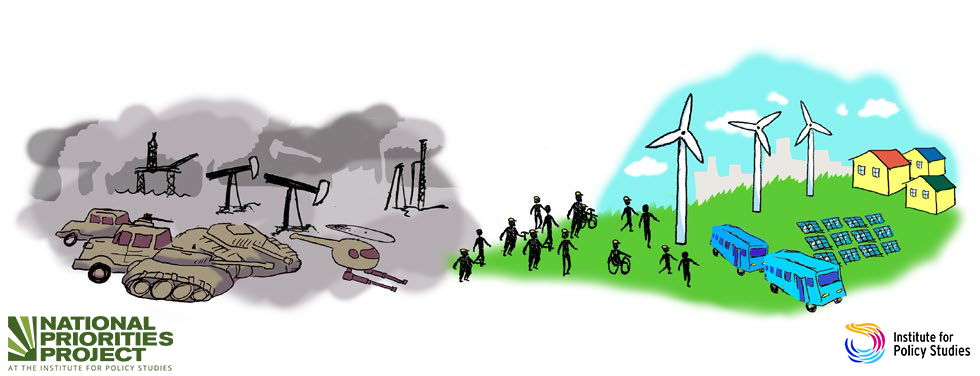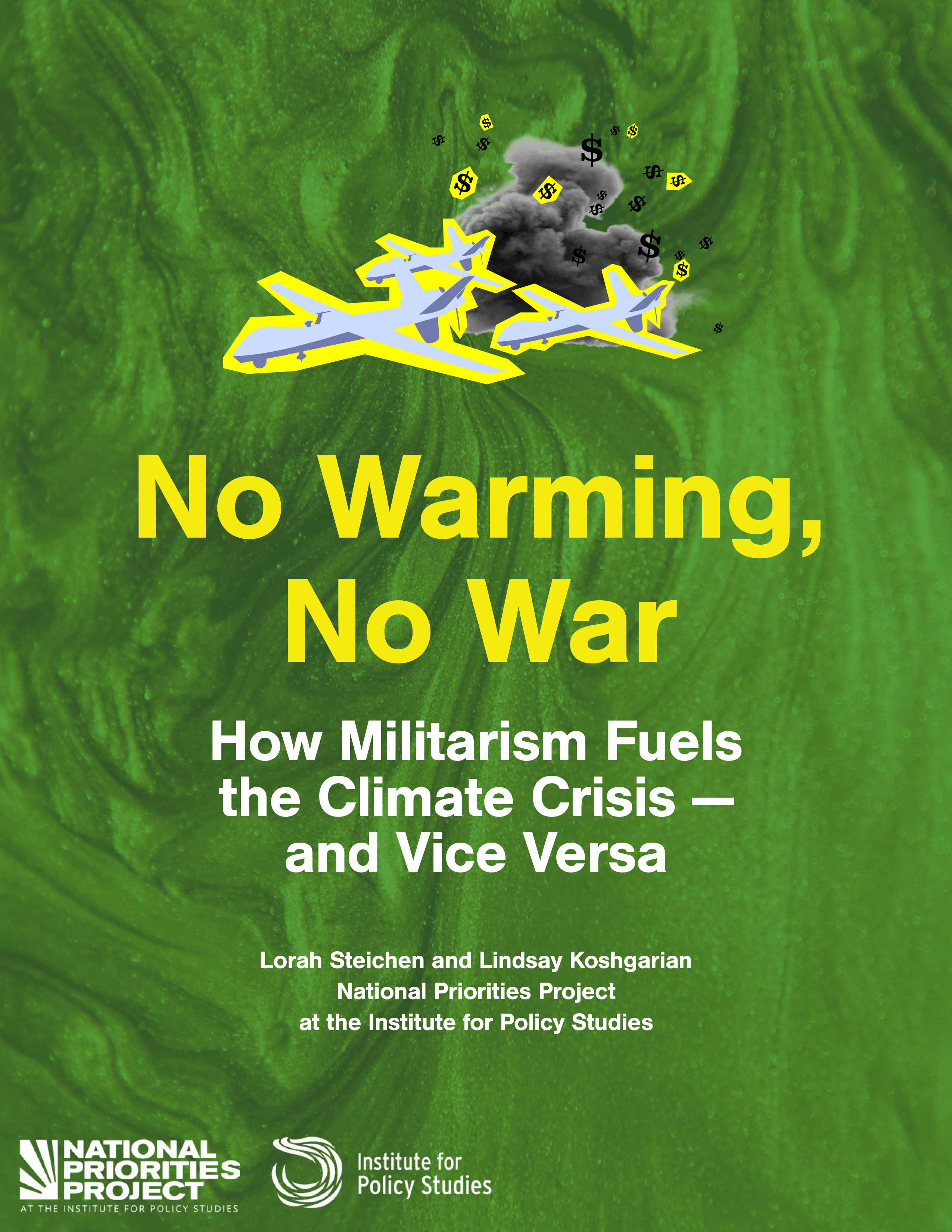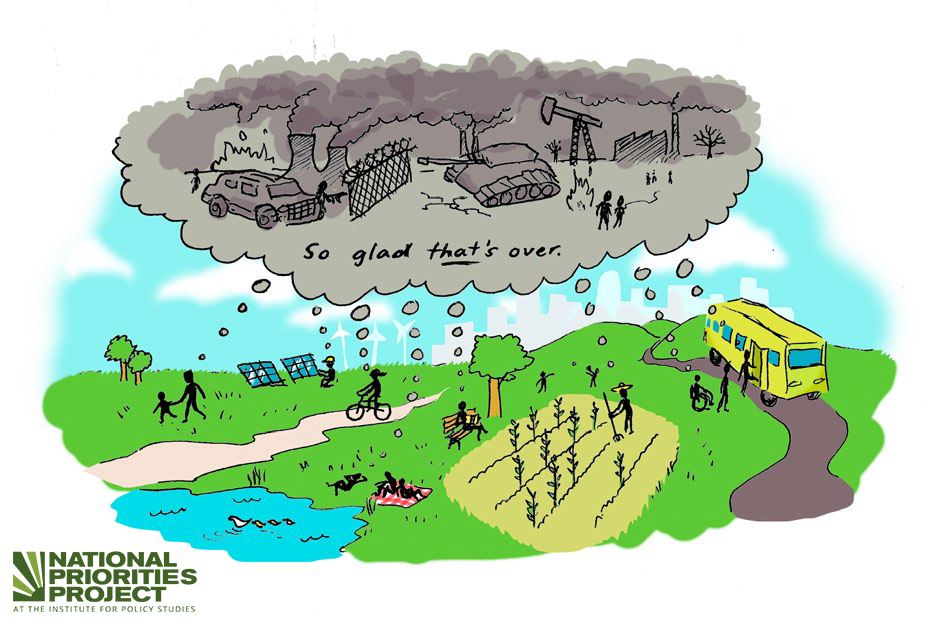No Warming, No War: How Militarism Fuels the Climate Crisis—and Vice Versa
April 22, 2020 - Download PDF Version

In a strange twist, it has taken a global pandemic to significantly reduce the world’s fossil fuel emissions.
The COVID-19 pandemic has utterly changed life as we know it — but it’s also laid bare how Washington’s militaristic budget priorities have left the country woefully unprepared for a crisis. With massive shortages in public health resources and shocks to the broader economy throwing Americans off their health care, states are left clamoring for help from the military to cope.
All this could be a preview of shocks to come as our climate crisis continues unabated.
While meaningful climate action has stalled on Capitol Hill and in the White House, planners at the Pentagon have been quietly preparing a militarized, “armed lifeboat” response to climate chaos for years. Unfortunately, the tendency to understand climate change as just another national security issue has misdirected resources away from the programs that we need to mitigate and adapt to a warming climate.
In this report, we lay out how militarism and the climate crisis are deeply intertwined and mutually reinforcing. The military itself, we explain, is a huge polluter — and is often deployed to sustain the very extractive industries that destabilize our climate. This climate chaos, in turn, leads to massive displacement, militarized borders, and the prospect of further conflict.
True climate solutions, we argue, must have antimilitarism at their core.
In the face of both COVID-19 and the climate crisis, we urgently need to shift from a culture of war to a culture of care. Funneling trillions into the military to wage endless wars and project military dominance has prevented us from investing in true security and cooperation. If we don’t transform our society and the way we confront crises, we will face even more unjust and inhumane realities in a climate-changed future.
Download the full report here.
Download the report by section:
- Introduction
- The Military and Climate Change
- Killing for Oil
- Climate Change, Immigration, and Militarization
- The Federal Budget and Militarized Spending
- Green Jobs and a Just Transition for Workers and Communities
- Resources and Next Steps
KEY FINDINGS:
Recognizing that the impacts of climate change will dramatically increase instability around the globe, this paper examines the role of militarism in a climate-changed world. As outlined below, climate change and militarism intersect in a variety of alarming ways:
- The Pentagon is a major polluter. U.S. militarism degrades the environment and contributes directly to climate change. The Pentagon is the world’s largest institutional user of petroleum; just one of the military’s jets, the B-52 Stratofortress, consumes about as much fuel in an hour as the average car driver uses in seven years. Plans to confront climate change must address militarization, but “greening the military” misses the point entirely. Militarism and climate justice are fundamentally at odds.
- The United States has a well-known history of fighting wars for oil. The fossil fuel industry relies on militarization to uphold its operations around the globe. Oil is the leading cause of war: An estimated one-quarter to one-half of all interstate wars since 1973 have been linked to oil. And all over the world, those who fight to protect their lands from extractive industries are often met with state and paramilitary violence.
- Climate change and border militarization are inextricably linked. It is clear that on a warming planet, cross-border migration will rise. Estimates project that around 200 million people will be displaced by the middle of century due to climate change. As the U.S. continues to ramp up border security, so do threats to all people’s freedom to move and stay. Immigrant justice is climate justice, and challenging militarism is critical to achieving both.
- Over-investment in the military comes at the high cost of under-investing in other needs, including climate. For decades, the U.S. has invested in military adventurism and prioritized military threats above all over threats to human life. Compared to the $6.4 trillion spent on war in the past two decades, the cost of shifting the U.S. power grid to 100% renewable is an estimate $4.5 trillion. The bloated U.S. war economy presents an opportunity to redirect significant military resources, including money, infrastructure, and people, toward implementing solutions to climate change.
- Workers need a way out. The fossil fuel and military sectors mirror each other in the way that workers frequently end up funneled into lethal work due to limited options. We need a Just Transition for workers and communities in both sectors. In order to rapidly transition to a green economy, we must fund millions of jobs in the green economy. Funding the green economy instead of a bloated military budget would be a net job creator; for the same level of spending, clean energy and infrastructure create over 40% more jobs and energy efficiency retrofits create nearly twice the level of job creation.
- Racism and racial oppression form the foundation for both the extractive fossil fuel economy and the militarized economy. Neither could exist without the presumption that some human lives are worth less than others, and racial justice would undermine the foundations of both.
Visit the full website for the No Warming, No War report, with shareable facts, graphics, and illustrations.

